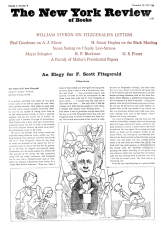In response to:
Trials and Errors from the October 31, 1963 issue
To the Editors:
Since the reviewer of Pawel Mayewski’s novel, The Journey and the Pity, feels that “the story is pervaded by the same vagueness and illogic that afflict the title” it might be relevant to point out what the source of the title was. It is from Dante. The first two stanzas of Canto II of the Inferno:
The light was departing. The brown air drew down all the earth’s creatures, calling them to rest from their day-roving, as I, one man alone,
prepared myself to face the double war of the journey and the pity, which memory shall here set down, nor hesitate, nor err.
This translation is by John Ciardi. Your reviewer goes on to say that “journey and pity are trochaic nouns which have a weak assonance in common but no overlap of meaning.” This is an objection which might more appropriately be brought to the attention of Mr. Ciardi. But to say that “the emotion of pity is quite inconspicuous in the story, and none of the characters takes a journey” is to betray ignorance not only of the Dantean metaphor, but of the fundamental impulse and purpose of Mayewski’s work. Perhaps one can expect no better from a “reviewer” who blandly admits his incapacity to discern “what has just happened or is presently happening.” It is to be hoped, however, that other readers will find, as I did, neither vagueness nor illogic in Mayewski’s story, but, on the contrary, the terrible lucidity and heartless reason of the power manipulators of our time.
Dante, too, was an exile.
Cleveland Moffett
New York City
George P Elliott replies:
Mr. Ciardi’s translation of the line from Dante is accurate. In The Inferno the two nouns refer to two aspects of Dante’s imaginary pilgrimage; his journey was literarily lucid and specific and along the way his (and the reader’s) pity are evoked by many encounters. But taken out of the Divine Comedy and made into a title, the two nouns no longer mean what they mean there…(they) float vague and free of relevance. The Dantean reference would justify the title in part, if it were recognized; I cannot believe that many readers would recognize it without help any more than I did…
As for what matters far more, whether the story itself is clear, I hope that Mr. Moffett is right and it was only my incapacity which prevented me from seeing in it what he implies is there to be seen. But what he says he saw was only the parabolic meaning, which is clear enough. It is the parable itself that lacks vividness; and without its parable, a meaning usually does not matter so much.
This Issue
November 28, 1963



